
2023 Volvo V90 Parking Assistance
Park Assist
The Park Assist System uses sensors to assist the driver when manoeuvring in tight spaces by indicating the distance to obstacles through acoustic signals combined with a graphic in the centre display.
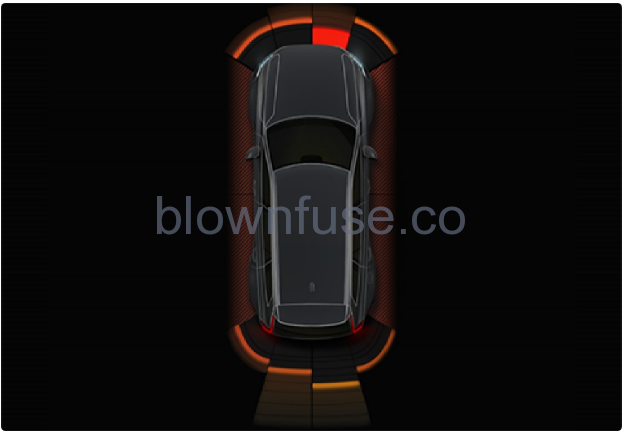
Example of screen view with obstacle zones and sensor sectors.The centre display shows an overview of the relationship between the car and detected obstacles.The highlighted sector indicates the location of the obstacle. The closer the car symbol is to a highlighted sector box at the front/back, the shorter the distance between the car and detected obstacle.The side sectors change colour as the distance between the car and an object is reduced.The shorter the distance to the obstacle, the faster the signal sounds. Other sound from the audio system is muted automatically.The acoustic signal for obstacles ahead and to the sides is active when the car is moving but stops after the car has been stationary for approx. 2 seconds. The acoustic signal for obstacles behind is also active when the car is stationary.At a distance within approx. 30 cm (1 foot) from an obstacle behind or in front of the car, the tone is constant and the active sensor field closest to the car symbol is filled.At a distance within approx. 25 cm (0.8 foot) from an obstacle to the sides, the tone pulses intensively and the active sector field changes colour from orange to red.The volume of the parking assistance signal can be adjusted while the signal is sounding by means of the [>II] knob on the centre console. Adjustment can also be performed in the parking assistance system’s settings.
Note
Except in the sector nearest to the car symbol, audible warnings are only given for objects directly in the path of the car.
Except in the sector nearest to the car symbol, audible warnings are only given for objects directly in the path of the car.
Warning
- The parking sensors are a complement to the driver’s attention to the surroundings around the car. Their ability to detect obstacles at certain angles can be affected by the conditions during use.
- Pay particular attention if there are people and animals near the car.
- Bear in mind that the front of the car may swing out towards oncoming traffic during the parking manoeuvre.
- Objects/obstacles may be closer to the car than they appear to be on the screen.
- The function is supplementary driver support intended to facilitate driving and make it safer – it cannot handle all situations in all traffic, weather and road conditions.
- The driver is advised to read all sections in the Owner’s Manual that relate to this function to learn about factors such as its limitations and what the driver should be aware of before using the system.
- Driver support functions are not a substitute for the driver’s attention and judgement. The driver is always responsible for ensuring the car is driven in a safe manner, at the appropriate speed, with an appropriate distance to other vehicles, and in accordance with current traffic rules and regulations.
Park Assist System front, rear and along the sides
Park Assist Pilot has different behaviour depending on which part of the car is approaching an obstacle.
Forwards
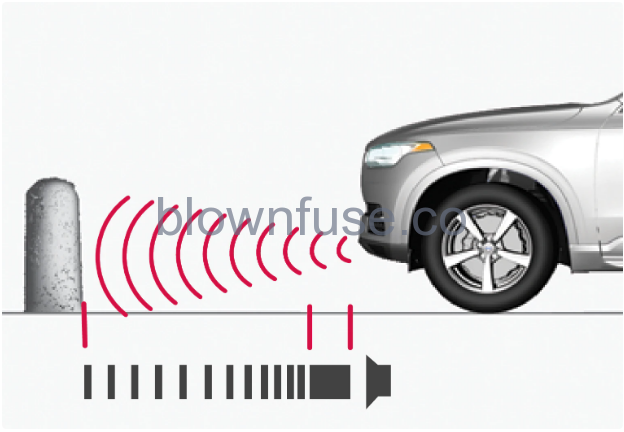
The warning signal has a constant acoustic signal at less than approx. 30 cm (1 foot) from an obstacle.The Parking Assistance System’s front detectors are activated automatically when the engine is started. They are active at speeds below 10 km/h (6 mph).The measuring range is approx. 80 cm (2.5 feet) in front of the car.
Note
Parking assistance is deactivated when the parking brake is used or P mode is selected in a car with an automatic gearbox.
Parking assistance is deactivated when the parking brake is used or P mode is selected in a car with an automatic gearbox.
Important
When auxiliary lamps are fitted: Remember that these must not obscure the sensors – the auxiliary lamps may then be perceived as an obstacle.
When auxiliary lamps are fitted: Remember that these must not obscure the sensors – the auxiliary lamps may then be perceived as an obstacle.
Backwards
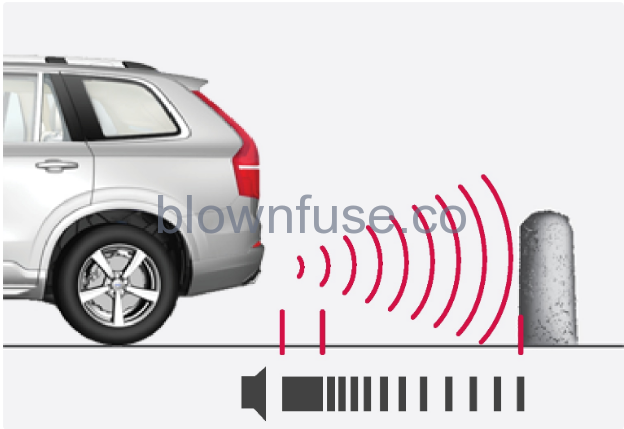
The warning signal has a constant tone at less than approx. 30 cm (1 foot) from an obstacle.The sensors for reverse are activated if the car rolls backward without a gear engaged or when the gear lever is moved to reverse position.The measuring range is approx. 1.5 metres (5 feet) behind the car.When reversing with a trailer connected to the car’s electrical system, parking assistance backward is deactivated automatically.
Note
When reversing with e.g. a trailer or bike carrier on the towbar – without Volvo genuine trailer wiring – parking assistance may need to be switched off manually in order that the sensors do not react to them.
When reversing with e.g. a trailer or bike carrier on the towbar – without Volvo genuine trailer wiring – parking assistance may need to be switched off manually in order that the sensors do not react to them.
Along the sides
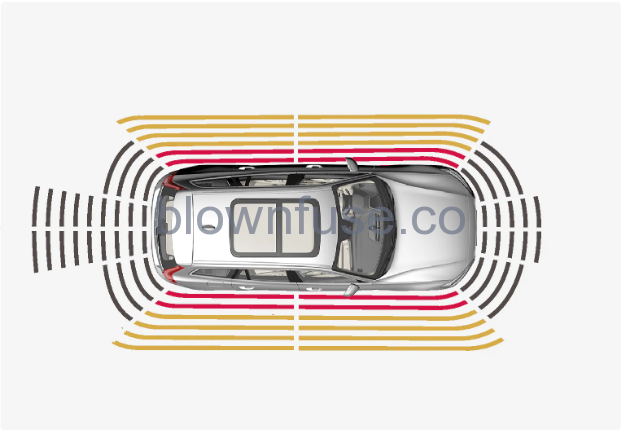
The warning signal pulses intensively at less than approx. 25 cm (0.8 foot) from an obstacle.Parking assistance side sensors are activated automatically when the engine is started. They are active at speeds below 10 km/h (6 mph).The measuring range is approx. 25 cm (0.8 foot) from the sides.However, the detection range of the side sensors increases significantly when the steering angle of the front wheels is increased, and obstacles of up to approx. 90 cm (3 feet) located diagonally behind or in front of the vehicle are detected when the steering wheel is turned.
Activating and deactivating Parking Assistance System
The park assist function can be activated or deactivated.The front and side parking assistance detectors are activated automatically when the engine is started. The rear detectors are activated if the car rolls backwards or when reverse gear is engaged.

Activate or deactivate the function with this button in parking camera view.
- Illuminated button – the function is activated.
- Extinguished button – the function is deactivated.
In cars equipped with a park assist camera, Park Assist Pilot can also be activated or deactivated from the relevant camera view.
Limitations of park assist system
The Parking Assistance System cannot detect everything in all situations and may therefore have limited functionality in some cases.A driver should be aware about the following examples of Park Assist Pilot’s limitations:
Warning
- The ability of the park assist cameras to clearly reproduce the surroundings in all zones around the car can be affected by the conditions during use.
- Pay particular attention if there are people and animals near the car.
- Bear in mind that the front of the car may swing out towards oncoming traffic during the parking manoeuvre.
- Objects/obstacles may be closer to the car than they appear to be on the screen.
Warning

Pay additional attention while reversing when this symbol is shown if a trailer, bicycle rack or similar is mounted and electrically connected to the car.Extinguished symbol indicates that the parking assistance sensors rearward are switched off and warn of any obstacles.
Important
Objects e.g. chains, thin glossy poles or low barriers may be in the “signal shadow” and are then temporarily not detected by the sensors – the pulsating tone may then unexpectedly stop instead of changing over to the expected constant tone.The sensors cannot detect high objects, such as projecting loading docks.
Objects e.g. chains, thin glossy poles or low barriers may be in the “signal shadow” and are then temporarily not detected by the sensors – the pulsating tone may then unexpectedly stop instead of changing over to the expected constant tone.The sensors cannot detect high objects, such as projecting loading docks.
- In such situations, pay extra attention and manoeuvre/reposition the car particularly slowly or stop the current parking manoeuvre – there may be a high risk of damage to vehicles or other objects since information from the sensors is not always reliable in such situations.
Important
In certain conditions the parking assistance system may produce incorrect warning signals that are caused by external sound sources with the same ultrasonic frequencies that the system works with.Examples of such sources include horns, wet tyres on asphalt, pneumatic brakes, exhaust noises from motorcycles, etc.
In certain conditions the parking assistance system may produce incorrect warning signals that are caused by external sound sources with the same ultrasonic frequencies that the system works with.Examples of such sources include horns, wet tyres on asphalt, pneumatic brakes, exhaust noises from motorcycles, etc.
Note
Since a towbar is configured with the car’s electrical system, towbar protrusion is included when the function measures the distance to an object behind the car.
Since a towbar is configured with the car’s electrical system, towbar protrusion is included when the function measures the distance to an object behind the car.
Symbols and messages for park assist system and park assist camera
Symbols and messages for Park Assist System and Park Assist Camera can be shown in the driver display and/or the centre display. Here are some examples.
| Symbol | Message | Specification |
|---|---|---|
 |
If the symbol is extinguished. | The rearward parking assistance sensors are deactivated, so there are no acoustic warnings and field marks for obstacles/objects. |
| Cleaning needed Park Assist System sensors blocked | One or more of the function’s sensors are blocked – check and correct as soon as possible. | |
| Park Assist System unavailable Service required | The system does not function as it should. A workshop should be contacted. |
A text message can be cleared by briefly pressing the ![]() button, located in the centre of the steering wheel’s right-hand keypad.
button, located in the centre of the steering wheel’s right-hand keypad.
If a message remains, contact a workshop – an authorised Volvo workshop is recommended.
Warning

Pay additional attention while reversing when this symbol is shown if a trailer, bicycle rack or similar is mounted and electrically connected to the car.Extinguished symbol indicates that the parking assistance sensors rearward are switched off and warn of any obstacles.
Defective park assist camera
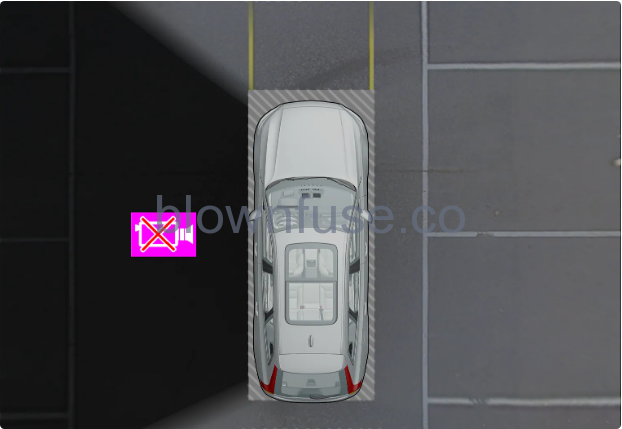
Example for showing when the car’s left camera is non-operational.
If a camera sector is black it means that the camera is inoperative.
A black camera sector is also shown in the following instances, but then without the symbol for defective camera:
- open door
- open tailgate
- folded-in door mirror.
